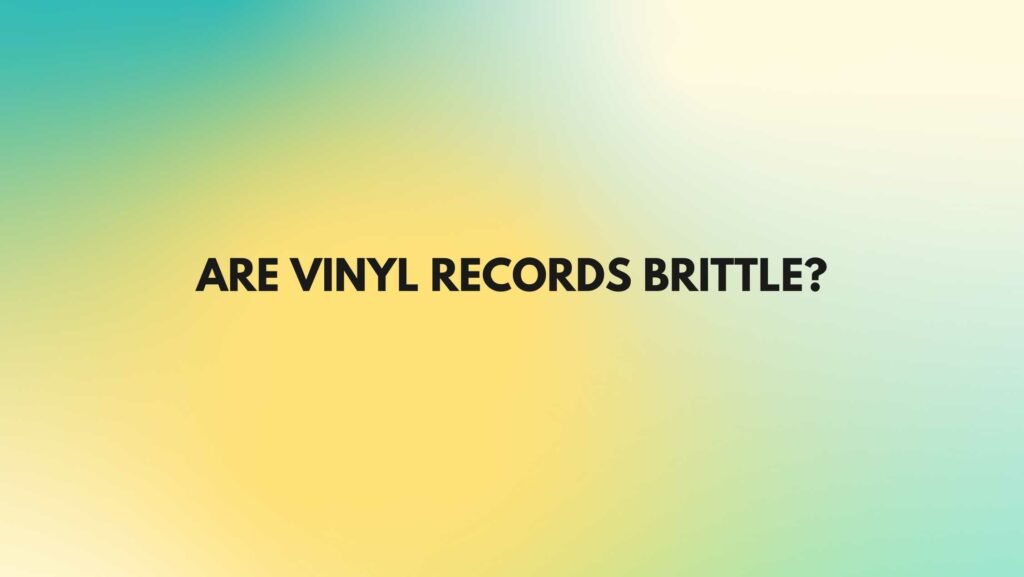Vinyl records have been a beloved medium for music enthusiasts for generations, known for their warm analog sound and tactile charm. However, their fragility and susceptibility to damage have often raised the question: Are vinyl records brittle? In this comprehensive article, we will explore the composition of vinyl records, their susceptibility to brittleness, common causes of damage, and how to properly care for and preserve these cherished musical artifacts.
Understanding Vinyl Records
Vinyl records are a type of analog audio storage medium that consists of a thin, flat disc made primarily from polyvinyl chloride (PVC). These discs are grooved with spiral tracks that contain audio information in the form of analog signals. When a stylus, often housed in a turntable’s tonearm, traverses these grooves, it converts the analog signals into audible sound.
The Composition of Vinyl Records
To better comprehend whether vinyl records are brittle, it’s essential to understand their composition. Vinyl records are typically made from a blend of PVC, plasticizers, and various additives. The PVC provides the rigidity required for the record to maintain its shape, while the plasticizers add flexibility, making the vinyl more suitable for the grooving process. Additives like stabilizers and colorants may also be included.
The Susceptibility to Brittleness
Vinyl records, while not inherently brittle, can become brittle over time due to various factors. One significant factor is the quality of the vinyl material used in their production. High-quality vinyl records are more likely to resist brittleness compared to those made from lower-grade materials or recycled vinyl. Quality control during the manufacturing process plays a crucial role in determining a record’s longevity.
Common Causes of Brittleness
Several factors contribute to the brittleness of vinyl records:
- Exposure to Heat and Sunlight: Prolonged exposure to heat and sunlight can cause vinyl records to warp and become more brittle. High temperatures can soften the PVC, leading to warping, while UV radiation can degrade the vinyl’s molecular structure.
- Improper Storage: Storing records in an environment with high humidity or extreme temperature fluctuations can lead to warping and brittleness. Records should be stored upright and in a cool, dry place to prevent such issues.
- Neglect and Mishandling: Rough handling, such as dropping or mishandling records, can result in cracks and fractures. Neglecting to clean records before playback can also contribute to the accumulation of dust and debris in the grooves, causing needle damage and reduced sound quality.
- Chemical Exposure: Exposure to chemicals, including some cleaning solutions and environmental pollutants, can lead to vinyl degradation and increased brittleness over time.
- Age: Vinyl records naturally age, and with time, the plasticizers within the PVC can evaporate, making the vinyl more rigid and prone to brittleness.
Preventing and Mitigating Brittleness
To preserve your vinyl records and prevent brittleness, consider the following tips:
- Proper Storage: Store records vertically in a climate-controlled environment away from direct sunlight and sources of heat.
- Handling: Handle records with care, always holding them by the edges and avoiding contact with the grooved surface.
- Cleaning: Regularly clean your records with a proper vinyl record cleaning brush or cleaning solution to remove dust and debris that can damage the grooves and stylus.
- Use High-Quality Equipment: Invest in a quality turntable, cartridge, and stylus to reduce the risk of damage during playback.
- Avoid Exposure to Chemicals: Be cautious about using cleaning solutions that may contain harmful chemicals. Use dedicated vinyl cleaning products to protect your records.
Conclusion
In conclusion, vinyl records are not inherently brittle, but their susceptibility to brittleness depends on various factors, including the quality of the vinyl material, storage conditions, handling, and exposure to external factors. By taking proper care of your vinyl records and following best practices for storage and handling, you can ensure their longevity and continued enjoyment of the warm analog sound they provide. Vinyl records, when properly cared for, can be cherished artifacts that stand the test of time and continue to bring joy to music enthusiasts worldwide.


